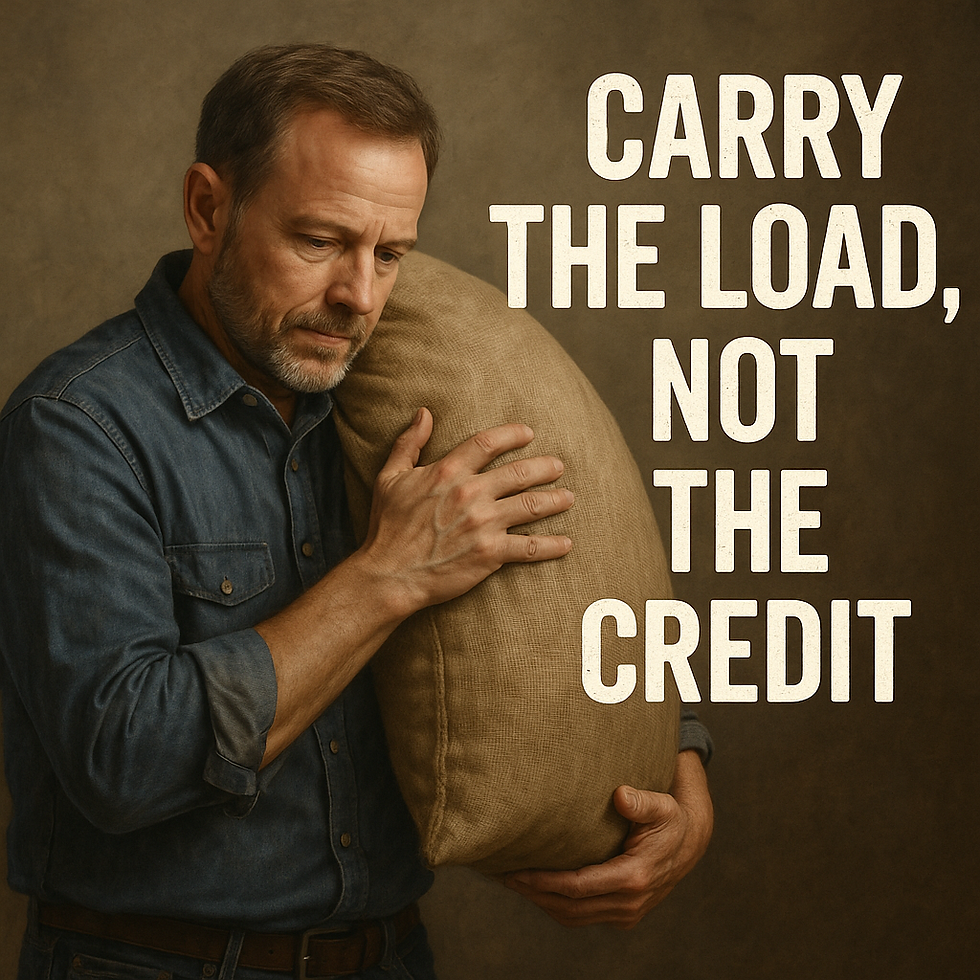Carry the Load, Not the Credit: The Covocational Call in Ezekiel 34
- Dave Miller

- Jul 18, 2025
- 4 min read
by Dave Miller

In Ezekiel 34, God confronts the shepherds of Israel—not for abandoning their post, but for twisting their role. They were still present, still active, still leading—but they were feeding themselves instead of the flock. These leaders used their position for comfort, status, and consumption rather than service, sacrifice, and cultivation. God’s rebuke is clear:
“Woe to the shepherds of Israel who only take care of themselves! Should not shepherds take care of the flock?” (Ezekiel 34:2, NLT)
This indictment becomes the foundation for a prophetic picture of what godly leadership should look like—servant-hearted, self-giving, and sacrificial. It’s a timeless vision that finds fresh application today in the growing movement of covocational leadership—those who are not only sent by Jesus into the world but also stay embedded in it through entrepreneurship, business, and the ordinary rhythms of work.
This is the way of the Sentrepreneur—a sent one who builds environments where others flourish, even if no one knows their name.
God’s Grievance: Consuming vs Cultivating
In Ezekiel 34, God is not angry that the shepherds are working; He is angry that they are exploiting the flock. They:
Eat the meat but do not feed the sheep (v.3)
Clothe themselves with the wool but do not heal the sick or bind up the injured (v.4)
Rule harshly and brutally rather than guide gently (v.4)
This reveals a fundamental principle:
Leadership is not about benefit to the leader; it’s about the flourishing of the people.
True leadership is carrying burdens, not collecting benefits. It’s building others up, not building your brand.
The Sentrepreneur does not live off people—they live for them. They don’t merely lead from a platform—they lead by planting gardens others will harvest. They know their role is to establish the environment, not control the outcomes.
The Messianic Pattern: God’s Better Shepherd
In the middle of the indictment, God promises a better way. He declares that He Himself will shepherd His people:
“I myself will search for my sheep and look after them… I will rescue them… I will bind up the injured and strengthen the weak…”
(Ezekiel 34:11–16, NLT)
Ultimately, this is fulfilled in Jesus, who calls Himself the Good Shepherd (John 10), laying down His life for the sheep. He didn’t just carry the load—He became the load. He bore the full weight of our sin, shame, and death.
The Sentrepreneur walks in the shadow of that Shepherd, not replicating His redemptive work, but reflecting His sacrificial posture. This is why covocational leadership is so powerful—it models the incarnation. We go into the world as Jesus did: not to be served, but to serve.
The Call Today: Carry the Load, Not the Credit
In a world obsessed with influence, platforms, and visibility, Ezekiel 34 calls us back to the soil of service. God isn’t recruiting celebrities—He’s forming shepherds. Leaders who:
Build businesses that give life instead of draining it
Launch projects that elevate others more than themselves
Lead teams with empathy, even when unrecognized
Choose obscurity over applause if it means the flock is fed
The Sentrepreneur understands that faithfulness outweighs fame.
The metric of success is not visibility but vitality—are the people around me thriving?
Creating Environments for Others to Flourish
This is the task of modern shepherds: to establish environments where people can grow, contribute, and thrive. Not environments built on ego, hustle, or control—but environments marked by trust, empowerment, and grace.
Like good soil, the Sentrepreneur creates space for:
Innovation to rise from the ground up
Discipleship to grow in the cracks of the everyday
Communities to form organically around shared work and purpose
People to encounter the presence of Jesus not just in a building, but in boardrooms, barbershops, and backyards
This is not glamorous work. It’s quiet. Hidden. Often thankless. But it’s the way of the kingdom.
Shepherding in the Marketplace
Ezekiel 34 is not just a judgment on failed shepherds—it’s a blueprint for faithful ones. In a world of hustle and self-promotion, the call to carry the load more than the credit is a radical act of obedience and trust.
The Sentrepreneur is a covenantal shepherd in the marketplace—carving out space for others to flourish, even at cost to themselves. They believe the same God who rebuked the shepherds of Israel is still looking for those He can trust with His flock.
And when He finds them—faithful, grounded, and willing to serve—He says, “I will make a covenant of peace with you” (v.25). He blesses them. And through them, He blesses the people.
If you’re building something—whether it’s a business, a community, or a team—may you be the kind of shepherd who feeds the flock instead of feeding off of them. Carry the load. Let others carry the credit. That’s the way of the Kingdom.
A further note:
Many times when we hear the word shepherd, we automatically associate it with the role of a pastor—often assuming it implies a formal, paid position within the church. But in the kingdom, shepherds are simply leaders, and all leaders are expected to care for people. Shepherding doesn’t require a pastoral title, nor does it have to be your primary APEST gifting (Apostolic, Prophetic, Evangelistic, Shepherding, Teaching). What it does require is a posture of responsibility. Any follower of Jesus who leads in any sphere—whether in business, education, community, or the home—is stewarding kingdom relationships. This shepherding posture is central to our identity as ambassadors of the King, regardless of environment or title. If you carry influence, this is the kingdom way.


Comments